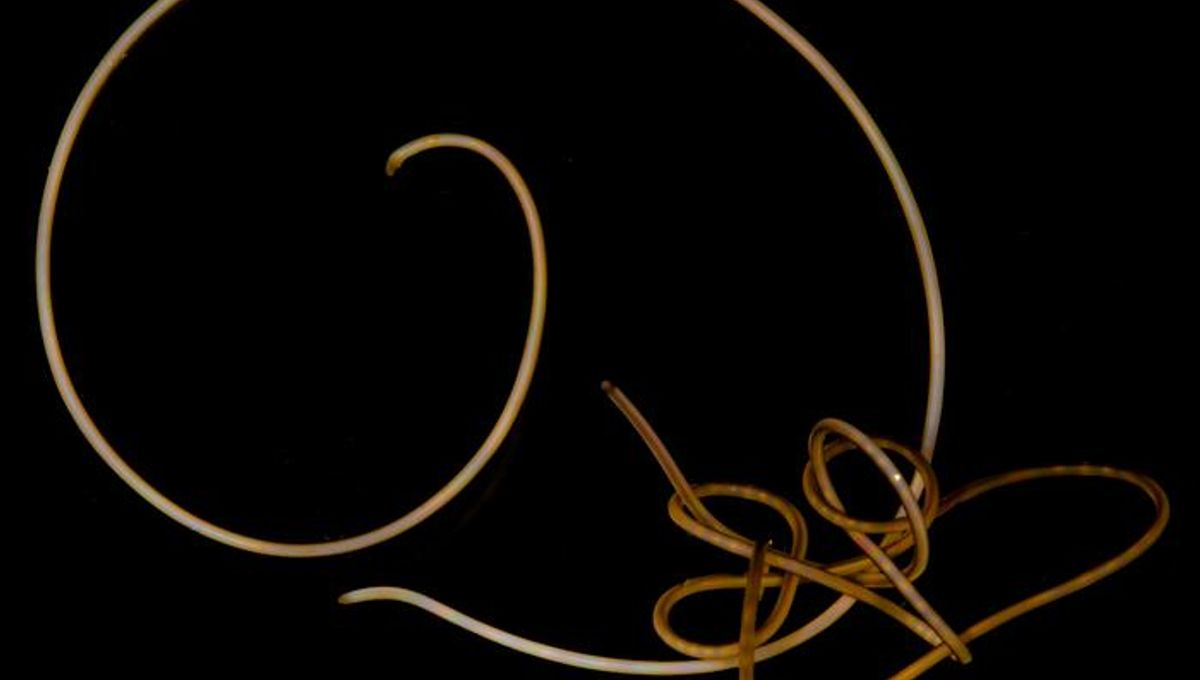
Hairworms are noodle-like parasites in the phylum Nematomorpha that are able to manipulate the actions of their hosts. Now, a new paper has presented the first genomes for these worms, revealing that they’re even weirder than we thought.
“Nothing like them has ever been sequenced before at that level,” said lead author Tauana Cunha, a postdoctoral researcher at Chicago’s Field Museum, in a statement. “What we found, which was very surprising, was that both hairworm genomes were missing about 30% of a set of genes that are expected to be present across basically all groups of animals.”
The authors assembled genomes of the freshwater species Acutogordius australiensis and the marine species Nectonema munidae, and looked at benchmarking universal single-copy orthologs (BUSCOs), used to estimate how complete genomic data is. The authors point out in the paper that “[e]ven the model nematode Caenorhabditis elegans, well known for its small genome […] has only 11% missing BUSCOs.”
So what are these missing genes connected to? A lot were associated with hair-like structures on cells called cilia. “Mechano- and chemosensory perception, as well as male gamete motility, are some of the important roles played by ciliary structures across animals,” the authors explain. “Nematomorphs, however, are known for aflagellate spermatozoa.” That’s right – their sperm cells don’t have tails!
“Based on previous observations, it didn’t seem like hairworms had any cilia, but we didn’t really know for sure,” Cunha said. “Now with the genomes, we saw that they actually lack the genes that produce cilia in other animals – they don’t have the machinery to make cilia in the first place.”
This change in the genome likely happened in a common ancestor of modern nematomorphs. “There are plenty of other parasitic organisms that aren’t missing these specific genes, so we cannot say that the genes are missing because of their parasitic lifestyle,” Cunha explained. “But parasitic organisms in general are often missing lots of genes. It’s hypothesized that because parasites are not using certain structures and instead rely on their hosts, they end up losing those structures.”
Hairworms dip in and out of the water over the course of their life, depending on hosts to ferry them around. Their larvae hatch in the water and are subsequently eaten by aquatic insects that are then eaten by land-dwelling critters such as mantises or crickets, within which the worm grows. This is where the hairworm hits a snag: how does it get back into the water to reproduce and begin the cycle anew? This is where “mind control” comes in handy – the worms manipulate their hosts into hurling themselves into the water.
A 2021 paper proposed that they make their hosts attracted to polarized light bouncing off water. “The infected hosts that jumped into water became very important seasonal energy source for aquatic predators (salmonid fishes) in Japanese forested streams,” an author of that study, Takuya Sato, Associate Professor at Kobe University, Japan, told IFLScience at the time. “It is one of the good examples to show how parasites (that are easily overlooked in ecological studies) are important in mediating ecosystem processes.”
Indeed, the authors of the new paper say, “Gordioid horsehair worms are common parasites with notable effects on lotic systems, infecting a suite of host species in natural communities and drastically altering food webs and the energy flow in forest-stream ecosystems.”
“Despite their unique biology and ecological role, Nematomorpha is among the 10 animal phyla for which genomic representation has so far been neglected,” the paper concludes. “These genomic resources will serve as an atlas of nematomorph gene repertoire, opening new avenues for investigating the genomic mechanisms underlying parasitism, control of host behavior, and genome reduction.”
The study is published in the journal Current Biology.
Source Link: Host-Manipulating Parasitic Worms Lack Genes Every Other Animal Has